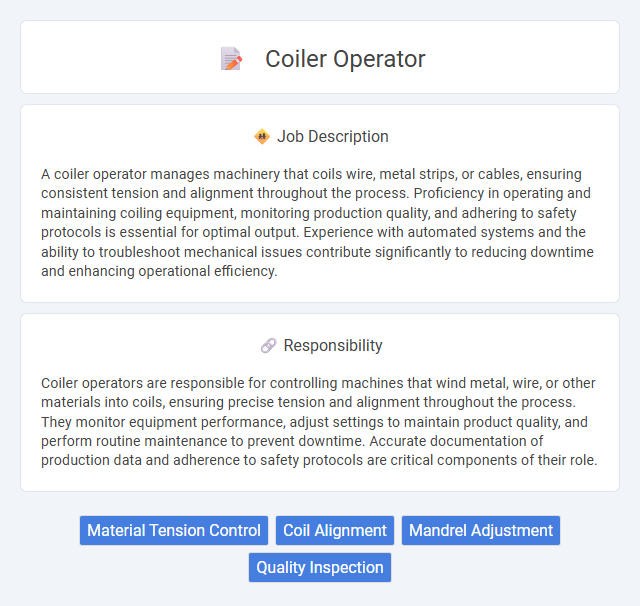
A coiler operator manages machinery that coils wire, metal strips, or cables, ensuring consistent tension and alignment throughout the process. Proficiency in operating and maintaining coiling equipment, monitoring production quality, and adhering to safety protocols is essential for optimal output. Experience with automated systems and the ability to troubleshoot mechanical issues contribute significantly to reducing downtime and enhancing operational efficiency.
Individuals with strong attention to detail and good hand-eye coordination are likely to be well-suited for a Coiler Operator position. Those who can maintain focus during repetitive tasks and work efficiently under moderate physical demands might find this role compatible with their skills and capabilities. Workers prone to fatigue or difficulty concentrating may face challenges adapting to the job's consistent operational requirements.
Qualification
Coiler operators must possess a high school diploma or equivalent, along with specialized training in metalworking and machinery operation. Proficiency with precision measuring instruments, mechanical skills, and knowledge of safety protocols are essential qualifications. Previous experience in manufacturing or steel processing environments enhances the operator's efficiency and reliability in handling coiling machines.
Responsibility
Coiler operators are responsible for controlling machines that wind metal, wire, or other materials into coils, ensuring precise tension and alignment throughout the process. They monitor equipment performance, adjust settings to maintain product quality, and perform routine maintenance to prevent downtime. Accurate documentation of production data and adherence to safety protocols are critical components of their role.
Benefit
Working as a Coiler Operator likely offers competitive wages and opportunities for overtime pay, enhancing overall earnings. Employees may benefit from healthcare packages, retirement plans, and paid time off, contributing to financial security and work-life balance. Job stability is probable in this role due to consistent demand in manufacturing and steel production industries.
Challenge
Coiler operator job challenges likely involve managing heavy machinery with precision to ensure consistent coil quality and avoid equipment malfunctions. Operators probably face pressure to maintain high productivity while adhering to strict safety standards in a fast-paced manufacturing environment. Troubleshooting mechanical issues and adapting quickly to process changes may also present ongoing difficulties.
Career Advancement
Coiler operator positions offer significant career advancement opportunities in the metal manufacturing industry, with pathways leading to supervisory roles, machine maintenance specialists, and quality control inspectors. Mastery of coil handling equipment and safety protocols enhances employability and opens doors to higher-paying roles such as production managers or equipment trainers. Continuous skill development, including technical certifications in machinery operation and process optimization, is essential for advancing a coiler operator's career trajectory.
Key Terms
Material Tension Control
A Coiler Operator is responsible for maintaining precise material tension control during the coiling process to ensure high-quality product output and prevent material damage. Effective tension management minimizes defects such as wrinkles, stretch marks, and misalignment in metal, plastic, or paper coils. Mastery of machinery settings, real-time monitoring systems, and adjustment techniques is essential for optimizing coil uniformity and production efficiency.
Coil Alignment
Coiler operators specialize in precise coil alignment to ensure optimal material handling and minimize production errors during metal processing. Accurate coil alignment enhances machine efficiency, reduces material waste, and maintains consistent product quality in steel or aluminum coil manufacturing. Mastery in coil positioning techniques and real-time adjustments is critical for seamless integration with rolling mills and downstream equipment.
Mandrel Adjustment
Coiler operators specialize in mandrel adjustment to ensure precise control over coil diameter and tension during metal winding processes. Accurate mandrel positioning minimizes material defects and optimizes the quality of steel, aluminum, or other metal coils. Mastery of hydraulic and mechanical adjustment systems is critical for maintaining operational efficiency and product consistency.
Quality Inspection
Coiler operators play a critical role in quality inspection by closely monitoring the coiling process to ensure the metal coils meet precise dimensional and surface finish standards. They utilize measurement tools and visual inspection techniques to detect defects such as cracks, scratches, or inconsistencies in coil tension and alignment. Maintaining strict adherence to industry quality control protocols, coiler operators help prevent product defects and guarantee compliance with customer specifications and safety regulations.
 kuljobs.com
kuljobs.com